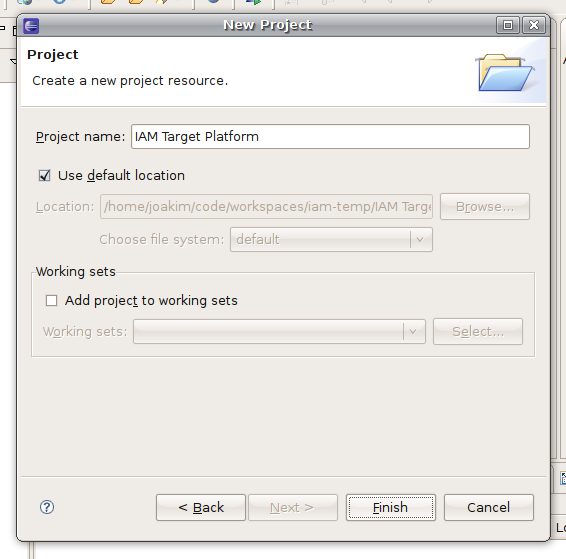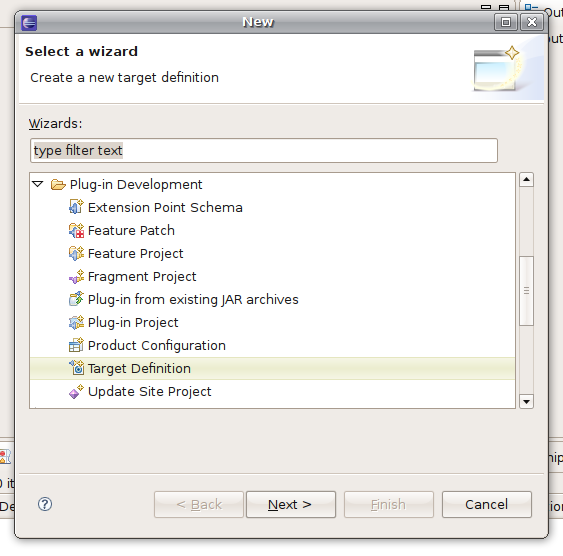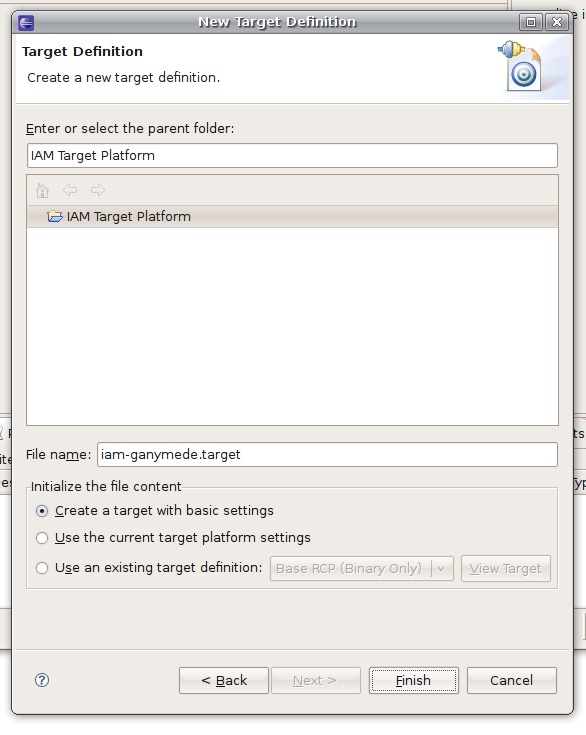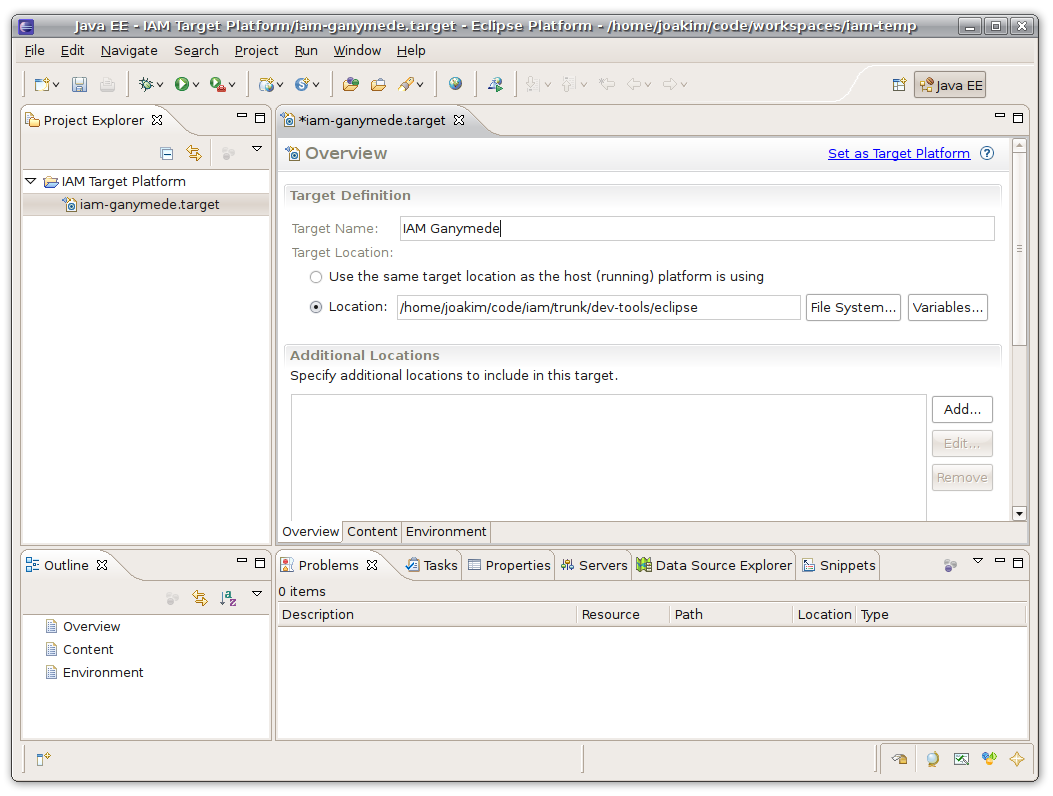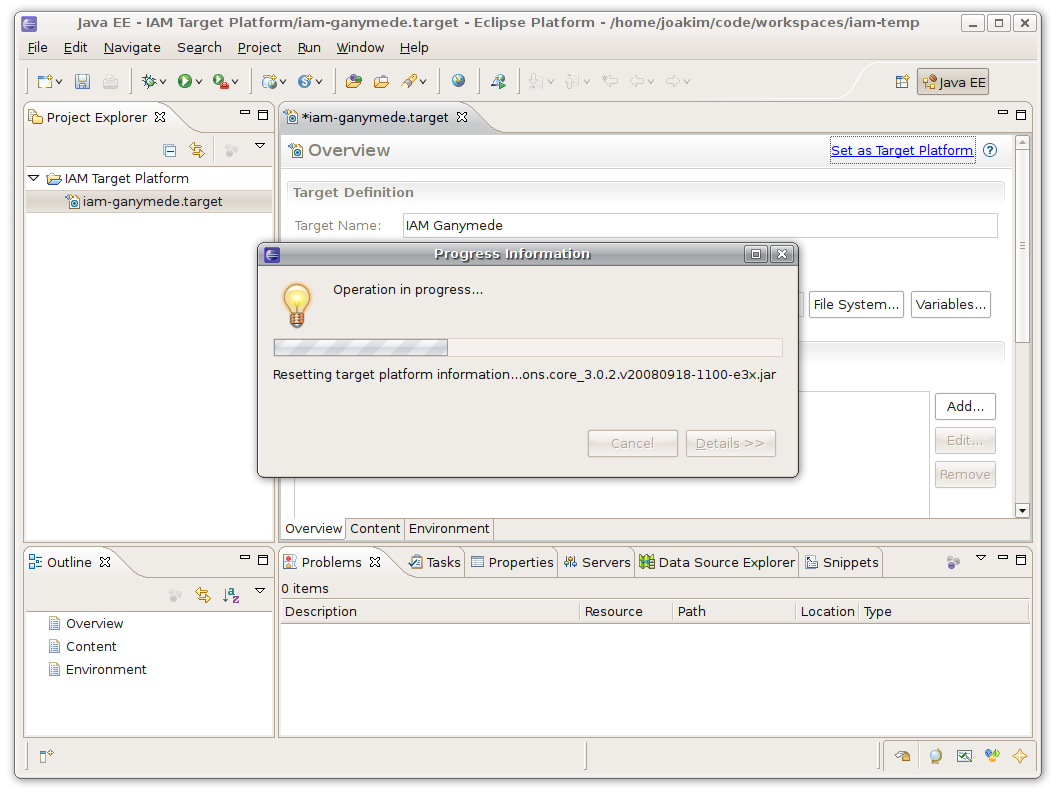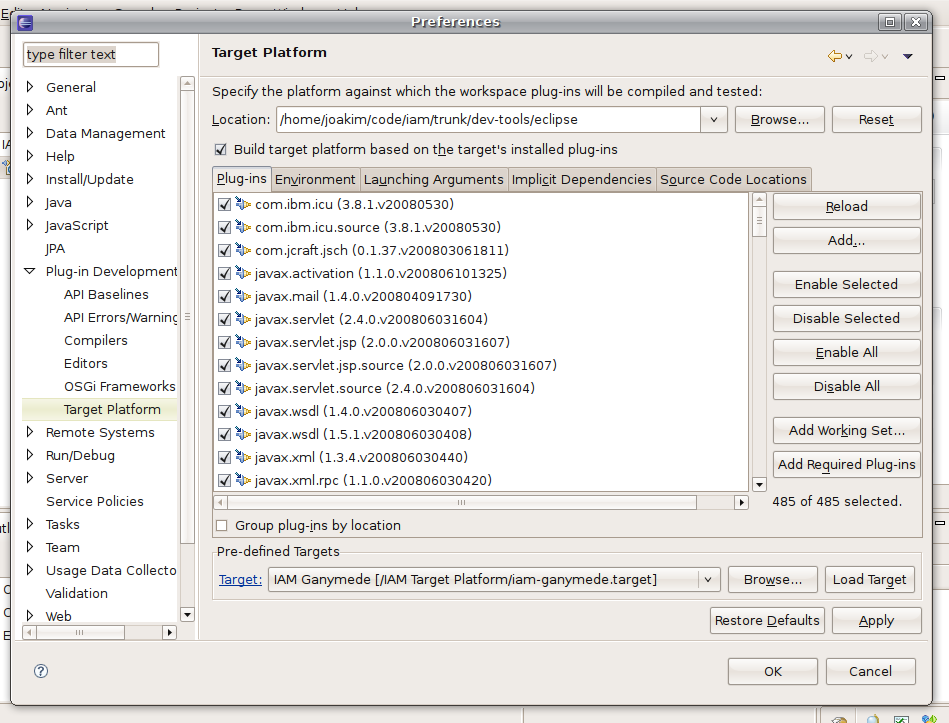Notice: This Wiki is now read only and edits are no longer possible. Please see: https://gitlab.eclipse.org/eclipsefdn/helpdesk/-/wikis/Wiki-shutdown-plan for the plan.
IAM Target Platform
< To: IAM Environment
Contents
Setting up the Target Platform
This page describes the process for setting up the target platform used to build IAM.
Install a new eclipse SDK
- Download the Eclipse SDK from:
- In order to benefit from the ant script to populate the eclipse installation, you will have to make sure you unpack the the eclipse installation into a folder called 'eclipse'.
- You can also utilize the ../trunk/dev-tools/eclipse folder as a default location to put your SDK installation into.
- Don't worry, that directory is ignored from being committed via an svn:ignore directive.
Example:
[dev-tools]$ pwd /home/joakim/code/iam/trunk/dev-tools [dev-tools]$ svn info . | grep URL URL: https://dev.eclipse.org/svnroot/technology/org.eclipse.iam/trunk/dev-tools [dev-tools]$ ls -l total 154976 drwxr-xr-x 9 joakim joakim 4096 2008-12-05 14:20 eclipse/ -rw-r--r-- 1 joakim joakim 3652 2008-12-05 09:58 eclipse-iam-cleanup.xml -rw-r--r-- 1 joakim joakim 27973 2008-12-05 09:58 eclipse-iam-codestyle.xml -rw-r--r-- 1 joakim joakim 107 2008-12-05 09:58 eclipse-iam.importorder -rw-r--r-- 1 joakim joakim 557 2008-12-05 09:58 eclipse-iam-java-templates.xml -rw------- 1 joakim joakim 158459954 2008-12-05 11:39 eclipse-SDK-3.4.1-linux-gtk.tar.gz lrwxrwxrwx 1 joakim joakim 34 2008-12-05 11:40 eclipse-SDK-3.4.1.tar.gz -> eclipse-SDK-3.4.1-linux-gtk.tar.gz -rw-r--r-- 1 joakim joakim 369 2008-12-05 09:58 header-feature.txt -rw-r--r-- 1 joakim joakim 306 2008-12-05 09:58 header-java.txt -rw-r--r-- 1 joakim joakim 456 2008-12-05 09:58 header-properties.txt -rw-r--r-- 1 joakim joakim 309 2008-12-05 09:58 header-xml.txt -rw-r--r-- 1 joakim joakim 6603 2008-12-05 09:58 iam-prep-target-platform.xml drwxr-xr-x 3 joakim joakim 4096 2008-12-05 11:41 workspace/
Install the required bundles
The iam-prep-target-platform.xml (ANT Script) uses Ant 1.6.5+ & the P2.director application to populate the target-platform with the selection of plugins and features that IAM uses to build & test against.
The iam-prep-target-platform.xml ant script is checked into subversion at [1], you should check out all of trunk anyway if you are going to be working on IAM.

|
Advanced users can create a local.properties file on the script folder to override the defaults used. |
Basic operation of ant script...
[dev-tools]$ ant -f iam-prep-target-platform.xml |
The script execution will download bundles not hosted at eclipse.org
The ant script expects an Eclipse SDK installation to be present in the trunk/dev-tools/eclipse folder.
- Most bundles come from ganymede update site.
- (TODO: specify versions to avoid changes with maintenance releases.)
- AJDT is downloaded from the AJDT update site.
- Some bundles are downloaded from Orbit.
- JTidy is downloaded from q4e.
- (TODO: a CQ for JTidy it is warranted, but maybe not needed if we upgrade the embedder)
Configure a target definition
Target platforms are managed through target definition files. You will need to set up your own target definitions.
- Start your eclipse (i.e. do not use the new installation you've just set up)
- Create a new (simple) project. You can name it IAM Target Platform
- Select the IAM Target Platform project and create a new Target Definition.
- Fill out the Target Definition Details
- Select the IAM Target Platform project you created earlier.
- Enter 'iam-ganymede as the name of the file. (NOTE: dialog will supply the ".target" suffix on its own)
- Select the "Create a target with basic settings" for the file content selection.
- You are done. Select Finish.
- At this point you will have Target Definition Overview page presented to you. Fill it out accordingly.
- Set Target Name to IAM Ganymede
- Set Target Location to your .../trunk/dev-tools/eclipse folder that you initialized in the previous section.
- Now we need to set this configuration as the Target Platform. Click on Set as Target Platform (you will need to repeat this last step if you change the bundles installed on your target definition).
- Almost done, now verify that the Target Platform has been created successfully.

